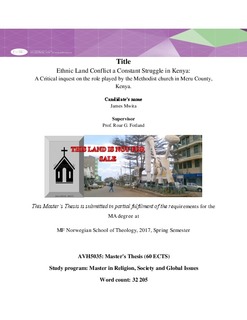| dc.description.abstract | In Kenya, the occurrence of ethnic land conflict seems to be frequent. As such, the Church in general and in particular the MCK has divine role to cognize and makes use of her call to the mission of reconciliation in fostering unity among the people in the current society. However, one wonders if the Methodist church in Kenya has played any role in mitigating ethnic land conflict among the Ameru people of Kenya. This study, investigate the causes of ethnic land conflict in Meru County, Kenya, the role played by MCK and if the church has any known strategy in place to deal with ethnically land-related conflict. Third, to assess the role of indigenous institution Njuri Ncheke of Meru and Methods used to resolve the land conflict. The study was funneled by two theoretical perspectives, ethnic conflict theory and reconciliation theory of Atonement. The study was guided by research question, what causes ethnic land conflict and what should be the role of the Methodist church in mitigating ethnic land conflict among the Ameru people of Meru County, Kenya? The other sub-research questions are; what are the perception and causes of ethnic land conflicts among the Ameru people? Does the Methodist Church have any strategy for resolving ethnic land conflict? What has been the role of indigenous institutions the Njuri Ncheke of Meru in dealing with land disputes? The study established that the causes of ethnic land conflict are political influence, disputed on land boundaries / historical land grievances, land titling, and adjudication. The study’s findings are: MCK has not played any role, Njuri Ncheke is a trusted and has methods like; oathing, dialogue and instilling of discipline. The study recommends use of complementary theoretical perspectives for further research and knowledge supplement in mitigation of ethnic land-related conflict in this field. | nb_NO |
